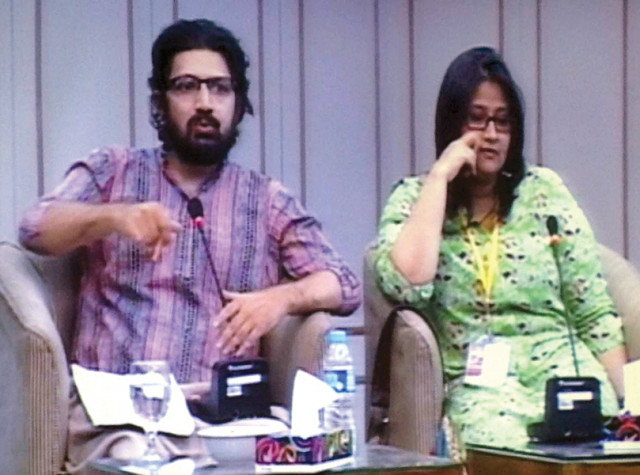ILF: Nothing succeeds like failure
Zinda Bhaag co-directors recount journey, look determined to keep making films.

Zinda Bhaag co-directors recount journey, look determined to keep making films.
All odds were stacked against them. A local subject treated largely in the Punjabi language, small budget, a sad ending, no known faces and to top it all off, a debut for almost all including the directors and producer. But “Zinda Bhaag” (ZB), a movie released last year, despite all odds proved a brilliant cinematic success.
“The more local you are, the more global you get,” said Meenu Gaur, the co-director of the movie, at the ILF on Sunday afternoon. She was responding to a question by the host Samar Minallah, a filmmaker herself.

Pakistani cinema saw signs of resurgence with Shoaib Mansoor’s “Khuda Kay Liye”. There are already others in the fray experimenting to good effect.
With beaming eyes and smiling faces, the two directors of ZB looked at ease answering questions.
“Doing background research [for the film] was great fun,” said Farjad Nabi when asked how they could penetrate to such level of existence and then treat it in the movie.
The three male leads in the movie want ‘shortcuts’ in their lives and eventually meet an undesirable end. Conversely, female character Rubina acts as a foil and emerges as an extremely strong character who believes in small steps at a time and remains steadfast throughout, explained the directing duo.
Responding to whether it was a commercially viable venture, Gaur said “It was beyond our expectations and good enough for us to keep making films.”
The directors made a conscious effort to bring out ‘Lahori culture’ and a touch of 1970’s cinema.
Another distinct feature of the film, as shown in short video clips, was the inclusion of a variety of singers including the 70’s hit “Pani da bulbala”.
“Par chana de wase kuli yaar di” (across the Chenab my friend’s abode is) was another song that resonated with today’s realities. In the classic folklore “Sohni Mahinwaal”, Sohni swims across the river on a clay-pitcher to meet his beloved and drowns eventually.
Another song “Jo har gae ono, so par age ono” (If you lose, you win) drives home the fact that failure is also a success.
On why the movie was named the way they did, Gaur said the title captures desperation where running away is the only option, while Bhaag also has a secondary meaning — fate.
Samar concluding the session by bringing up a question from the movie, Is seawater hot or cold? The answer was, “It is deep.”
“Zinda Bhaag was a deep movie,” she said, with a multitude of layers to it.
Poets from G-B
Three poets from Gilgit-Baltistan (G-B) at a session at the ISL highlighted through their verses deprivation of the people.
Most of the countrymen may have little acquaintance with the cultural ethos and social milieus of G-B and its high peaks but the region remains an important conduit to cross cultural interaction and diversity.
Jamshed Dukhi, Nazir Bulbul and Aslam Saher participated in the session titled “Arz-e-Shumaal: Poetic Voices from Gilgit-Baltistan .
Dukhi in his poetry highlighted the deterioration of the society and hypocrisy of politicians, religious figures and the people at large.
“In G-B, we have golden eggs but no one is ready to hatch them,” he said while talking about the power outages in Gilgit city, despite the fact a mighty river flows just beneath them without being utilised for producing electricity.
Bulbul said that he and some other poets and literary figures were endeavouring to preserve the Wakhi languages, which according to him, was under the onslaught of external forces.
Saher presented his poetry in Baliti and Urdu.
Literary figure Mustansir Hussain Tarar said that every street of the region was laced with the golden eggs but what was missing or lacking was its patronage.
Published in The Express Tribune, April 28th, 2014.



















COMMENTS
Comments are moderated and generally will be posted if they are on-topic and not abusive.
For more information, please see our Comments FAQ